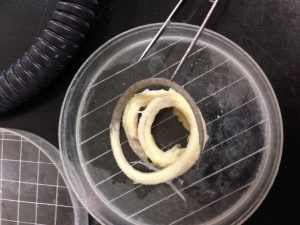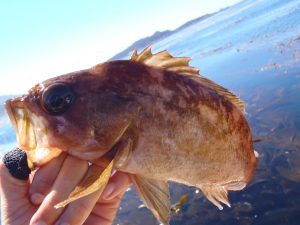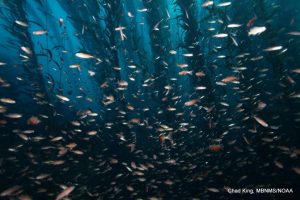 My last research update post was late last summer when I was still in the field, enjoying time on the sea – diving, fishing and boating. But, the fun inevitably ended and I’m left with piles of samples to process. Frozen fish heads filling lab freezers, vials of rockfish prey items soaking in ethanol, dried fin clips in envelopes covering my desk, fish ear bones (otoliths) drying in glass jars.
My last research update post was late last summer when I was still in the field, enjoying time on the sea – diving, fishing and boating. But, the fun inevitably ended and I’m left with piles of samples to process. Frozen fish heads filling lab freezers, vials of rockfish prey items soaking in ethanol, dried fin clips in envelopes covering my desk, fish ear bones (otoliths) drying in glass jars.The most exiting of these samples are the stomach contents – the fish puke preserved in ethanol and stored in a freezer. Aside from being fun to look at (and they are!), a look at a fish’s last meal can tell us a lot. Because I’m interested in the factors that contribute to production variability in nearshore fish populations, changes in a species’ diet is very important. I’m currently quantifying the extent and magnitude of predation by adult rockfish (and cabbies and lings) on juvenile rockfish YOY (young-of-the-year). By looking at predation patterns over time, then analyzing this data in the context of annual growth information (that I’ll be getting from otoliths – more about that in another post), I’ll be able to determine the influence that variation in YOY has on adult rockfish production.
My undergraduate work was done at Valparaiso University – thousands of miles from the nearest ocean. Not surprisingly, Valpo did not offer a Marine Invert Zoology course, so I did not come into this endeavor with much invertebrate identification knowledge at all. It’s been a learning process that I took on with a wonderful undergraduate volunteer from UCSC’s ecology program. I’ve learned that on long days – past the time in the afternoon when I want to stare at a computer, staring instead into a dissecting scope at partially-digested marine organisms makes for a very productive end to the day. Take a look below for a sampling of the prey items I’ve found.
A full red octopus (Octopus rubescens) is hard to mistake for anything else, though when only a tentacle or beak is present it can be tough to tell an octopus from a squid, both Cephalopods.

 We’ve been fishing all summer for both juvenile and adult rockfishes and are nearing the end of our major field season. So far this year, we’ve caught, clipped and released 789 fish! Though only 319 of these were kelp rockfish (Sebastes atrovirens), our target species
We’ve been fishing all summer for both juvenile and adult rockfishes and are nearing the end of our major field season. So far this year, we’ve caught, clipped and released 789 fish! Though only 319 of these were kelp rockfish (Sebastes atrovirens), our target species We’re currently in the middle of a very strong year for recruitment of juvenile rockfish – go diving, you’ll see juveniles everywhere! What does this mean for predators that rely on juvenile rockfish as prey or for invertivores that supplement their diet with juvenile fishes during strong recruitment years? Does a high density of juvenile rockfish translate to healthy, fast-growing predators? We’re looking for volunteers to assist with diet component analyses for thirteen species of rockfishes, to collect field samples (think, fishing!), and to help analyze rockfish otoliths to determine annual growth.
We’re currently in the middle of a very strong year for recruitment of juvenile rockfish – go diving, you’ll see juveniles everywhere! What does this mean for predators that rely on juvenile rockfish as prey or for invertivores that supplement their diet with juvenile fishes during strong recruitment years? Does a high density of juvenile rockfish translate to healthy, fast-growing predators? We’re looking for volunteers to assist with diet component analyses for thirteen species of rockfishes, to collect field samples (think, fishing!), and to help analyze rockfish otoliths to determine annual growth.